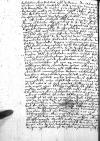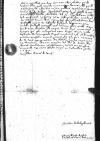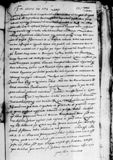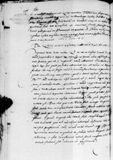Letter #3128
Stanisław HOZJUSZ (HOSIUS) to Ioannes DANTISCUSZator, 1547-06-17
| received Heilsberg (Lidzbark), 1547-06-26 Manuscript sources:
Prints:
| ||||||||
Text & apparatus & commentary Plain text Text & commentary Text & apparatus
Reverendissimo in Christo Patri Domino, domino
Reverendissime in Christo Pater et Domine, domine colendissime.
Officiosissimam servitutis meae commendationem.
Consilium oratorum ego probare non possum. Fortasse res aliter cessisset, si quo missi erant, eo profecti fuissent. De praepositura communicaverat mecum dominus docto[r]
Ago gratias Reverendissimae Dominationi Vestrae, quod Christophorum a Schedlin est in gratiam recip[ere] dignata. Commissio de cognoscenda appellatio[nis] causa fuit ante adventum ipsius huc expedit[a]. Et sunt alii qui pro Schroter multo magis laborant. Cupit Reverendissima Dominatio Vestra, ut dominorum consiliari[orum] dignitatis ratio habeatur. Contra Schroter vu[lt] haberi dignitatis regiae rationem. Per quam [cum] esset facta interpretatio verbi dienstphfichtig, quod erat in sententia Reverendissimae Dominationis Vestrae, decretum [est]: eum iuxta privilegii, quod obtulit, tenorem regiae maiestati servitutem, censum civitati debe[re]. Contra hanc sententiam pronuntiatum est a d[ominis] consiliariis, quod servitutem civitati debe[at], et pronuntiatum est non ex commissione da[ta] Elbingensibus, secundum quam actores ip[sos] Elbingenses, reum esse Schroter oportuit, se[d] secundum commissionem datam nobilitati territorii Marienburgensis, ubi actores fuer[unt] nobiles, quibus nescio quomodo se Schroter immiscuit, cum nihil ad eum pertineret, ita ut actoris et ipse partes sustinuerit. Ego certe magis cupio Elbingensibus, sed adhuc no[n] possum intelligere, quomodo inter alios a d[ominis] consiliariis ferri sententia potuerit, quam inter actores nobiles et inter Elbingenses. Proind[e] necesse est, ut aut ex commissione data Elbingen[sibus], aut ex ea, quae data est Schroter ad appellatione[m] prosequendam, a dominis consiliariis iudicet[ur], vel hoc saltem cognoscatur, num Elbingenses cor[am] iudicio Kirchspurgensi causam dicere teneantur. [Si] decretum fuerit, quod non, salva res erit Elbingensium, qui non aliunde appellarun[t], nisi a fundatione iurisdictionis iudicii illius Kirchspurgensis. Quodsi recte appellatum ibi pronuntiabitur, spero hic aliud decretum no[n iri]. Neque alia de re sententiam ferri convenit, qu[am] de qua appellatum est, ne plus in sententia sit, q[uam] fuit in appellatione. Haec ego non ideo scribo, quod velim sus, quod aiunt, Minerv[a]m docere, sed quod Elbingenses adiutos cupio, quibus tantopere favere Vestram Reverendissimam Dominationem video. Ignoscat, quaeso, si quid a me parum prudenter scribitur.
De domino castellano Elbingens[i] est mihi certe magnae curae, sed quid fieri oporteat, ex litte[r]is reverendissimi domini cognoscet. Supplicationem domini Scheffk[e] nuper in Christo defuncti reperire non potui. [F]ortasse necesse erit aliam huc mitti, nam quid in ea scriptum sit, neque reverendissimus dominus meminit, neque ego, qui nunquam eam legi.
Nova mitto descripta. Dominus Georgius Hegel mortuus est, sed mihi pecunia nihilominus numerata est, quo nomine Reverendissimae Dominationi Vestrae ago gratias. De fabula pestis cognoscet ex Mauricio.
Deum precor, ut Reverendissimam Dominationem Vestram quam diutissime servet incolumem et felicem. Cuius me gratiae commendo.
Ex
Eiusdem Reverendissimae Dominationis Vestrae servitor deditissimus






